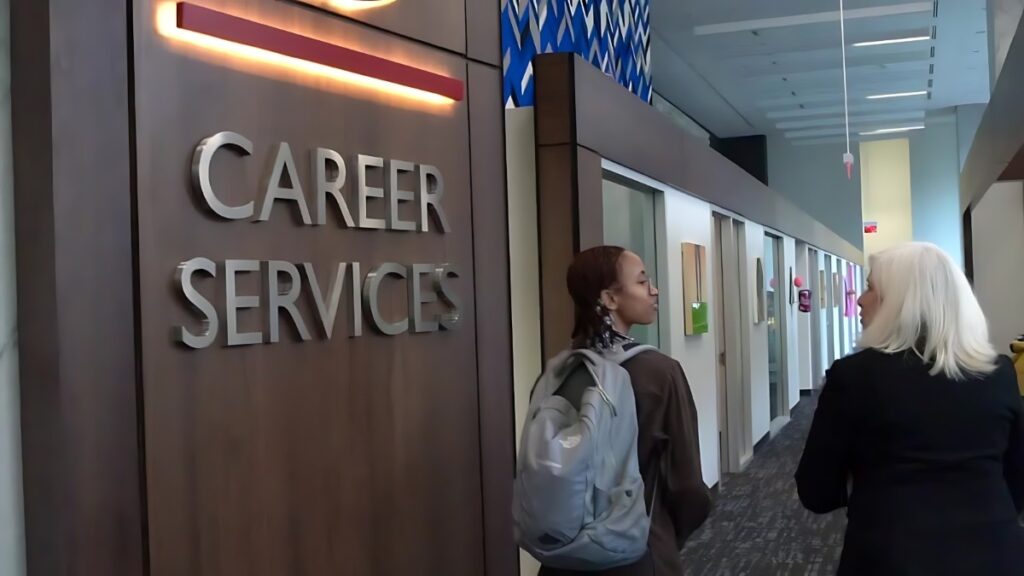
Land Your First Job
The question of “What’s next?” may be an anxious one for many students, even though graduating from college is a thrilling milestone. Getting that crucial first job, which could serve as the basis of your professional career, is one of the most important considerations. Students sometimes ignore one of the most effective tools available to them throughout the difficult job search process: the career services department at their institution.
A comprehensive analysis of how career services may help you obtain your first job will be covered in this blog, along with beneficial suggestions, the latest information on career development trends, and guidance on how to take full use of the options that your educational institution offers.
Understanding the Role of Career Services
The main objective of career services departments is to assist students and recent graduates in finding internships and jobs. They provide a variety of resources that will help you:
- Identify your career objectives.
- Get ready for your job hunt.
- Create a network of professionals.
- Get access to exclusive job openings
- Prepare yourself with the necessary job search abilities.
These services are important in providing you with a competitive edge, regardless of your current status i.e. whether you are seeking to gain job experience or seniors preparing to join the workforce.
Key Services Provided by College Career Centers
The main services that the majority of educational institutions provide throughout their career centers are broken down as follows:
1. Career Counselling and Goal Setting

Individualized career counselling is one of the main services provided by the majority of career centers. Career counsellors can assist you irrespective of whether you have a particular objective in mind or are uncertain about which career path you ought to pursue:
- Clearly define your professional objectives.
- Recognize your strengths and weakness.
- Match your major with possible career opportunities.
- Explore various fields and positions that appeal to you.
You may have an easier time navigate the job market after graduation if you use career counselling to help you create reasonable career objectives early on.
2. Resume and Cover Letter Assistance
When applying for jobs, a strong CV and cover letter are essential. Career centers often offer personal counselling and courses to assist you in creating exceptional cover letters and resumes. They are able to:
- Examine your present resume and make any changes that are necessary.
- Edit your CV to other fields or positions.
- Assist in writing cover letters that are tailored for specific jobs.
Potential employers are likely to be driven to a CV that effectively highlights your expertise, internships, and extracurricular activities.
3. Mock Interviews and Interview Preparation

Although they might be stressful, interviews are made better with experience. Mock interview sessions are provided by career services so that you may practice interviews in real life. These sessions will include:
- Get performance feedback
- Learn how to respond to typical and challenging interview questions
- Understand tone, body language, and the art of storytelling
- Develop the confidence to manage a range of interview situations, including in-person and phone interviews.
A lot of career centers also provide virtual mock interviews to get students ready for remote work prospects, since recent trends indicate that video interviews are becoming more common.
4. Career Fairs and On-Campus Recruiting
A great way for students to network with businesses, learn about other sectors, and find an internship and job opportunity is through career fairs. Often, your career center organizes:
- General career fairs with businesses from various sectors.
- Industries like as technology, healthcare, education, and others are the focus of industry-specific fairs.
- On-campus recruitment events occur when companies visit university campuses to interview students for open position.
If you want to learn about the job market, build your professional network, and perhaps get interviews right away, you must go to these events.
5. Internship and Job Placement Assistance

Students have special access to career and internship opportunities because of the strong relationships that many universities have with local businesses, startups, and national corporations. The career center can be able to assist:
- Provide guidance on when and how to submit an internship application;
- Get you in touch with companies looking for interns or entry-level staff
- Help you apply for jobs and make sure you’re focusing on the right opportunities.
In addition, a lot of educational institutions have specialized job boards or portals where they publish exclusive advertisements that aren’t accessible to the public.
6. Alumni Networking Opportunities
The alumni network at your college is a valuable but underutilized tool for job searchers. Students and graduates are regularly connected by several career centers through:
- Networking events
- Informational interviews
- Mentorship programs
Alumni can often be more than happy to give you advice, connect you with work opportunities, and even direct you to vacancies in their organizations. These relationships are especially helpful when entering highly competitive markets.
7. Skills Development Workshops

Having technological abilities could potentially be essential in today’s work environment. Workshops to build essential skills like these are offered by several career services:
- Technical skills: Coding, graphic design, data analysis, etc.
- Soft skills: Communication, teamwork, leadership, and time management
- Professional skills: Networking, email etiquette, and LinkedIn optimization
Participating in these programs improves your CV and gets you ready for the interpersonal and technical demands of the job.
Leveraging Career Services for Long-Term Success
The most effective job seekers are those that interact with the career services department frequently and early on in their undergraduate careers, despite the fact that many students view them as a last-minute resource before graduation. You may maximize career services in the following ways:
Freshman and Sophomore Year: Build Your Foundation
Use career counselling services for research into other businesses and opportunities for careers throughout your early college years. Even if you’re not quite prepared to apply for jobs, you should nevertheless go to career fairs to start expanding your professional network.
Key Focus Areas:
- To obtain experience, seek into volunteer and internship opportunities.
- Even if your resume only highlights your academic achievements and extracurricular interests, get to work on it.
Junior Year: Gain Experience and Prepare for Internships
Start treating your job search with even more seriousness this year. Improve your CV and start submitting applications for internships by using the resources provided by your career center. To boost your confidence, practice interviews and take part in courses that will help you acquire the abilities you need for your intended professional path.
Key Focus Areas:
- Find an internship to gain relevant job experience.
- Concentrate on establishing relationships with industry professionals and alumni.
Senior Year: Launch Your Job Search
It’s important when it comes to your final year. Develop a customized job search plan in close collaboration with professional career counsellors. Participate in recruitment activities on campus and take benefit of every career fair opportunity. Apply as soon as possible, and use alumni contacts to get employment recommendations.
Key Focus Areas:
- Even before you graduate, apply for full-time jobs.
- Prepare for various job interview formats by doing many practice interviews.
Emerging Trends in College Career Services

Many career centers are making changes to offer even more cutting-edge services in response to the changing nature of the labor market and the growth of digital platforms. The following developments are changing the way career services are provided:
1. Virtual Career Services
Online resume reviews, video-based mock interviews, and virtual career fairs are just a few of the virtual job assistance services that many institutions now provide. Students who may be managing a busy schedule or studying remotely now have more freedom because of this change.
2. Artificial Intelligence (AI) in Job Matching
Career centers are using AI tools more and more to connect students with internship and job opportunities. To provide personalized job recommendations, these tools examine your CV, abilities, and career choices.
3. Emphasis on Gig Economy and Freelancing
As the gig economy continues to develop, more and more career centers are being established to provide training and career guidance for freelance careers. They offer advice on handling several job opportunities, contract work, along with developing a personal brand.
Conclusion
Although getting your first job can seem challenging, college career services are there to help you at every phase. You can build a professional network, find a job that fits your objectives, and negotiate the job market with confidence if you make the most of the tools offered. Recall that the sooner you use career services, the more prepared you will be for success in the long run.
Therefore, don’t wait until graduation to begin using your career center; do so now to get started on the road to a successful and satisfying career!
Read Also:- How To Improve My Legal Research And Writing Skills? || What Can You Do After M.Com? A Comprehensive Career Guide for 2024

